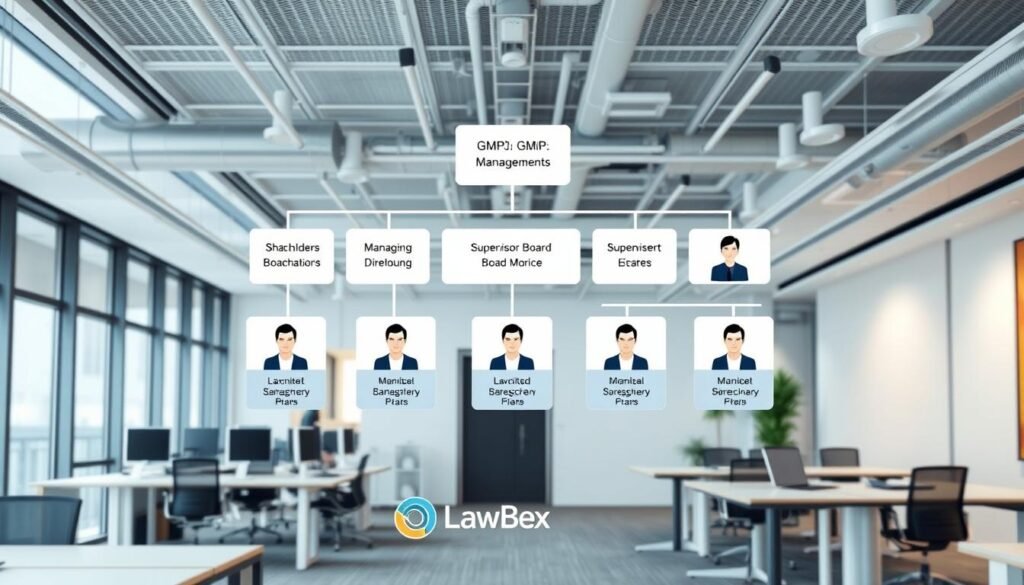Did you know the GmbH (Gesellschaft mit beschränkter Haftung) is a top choice in Europe? It’s a favorite among entrepreneurs and businesses for its limited liability benefits. This article will cover the GmbH law, helping you understand this business structure better.
Exploring GmbH law, you’ll learn about its history and benefits. We’ll discuss share capital, shareholder rights, and management. You’ll also get insights into annual reports, dissolution, and tax rules. Plus, we’ll talk about shareholder agreements and international aspects. By the end, you’ll see why the GmbH is a great option for businesses.
Key Takeaways
- The GmbH (Gesellschaft mit beschränkter Haftung) is the most popular business structure in Germany, with over 1.2 million registered companies.
- GmbH law, or the GmbHG, provides a comprehensive legal framework for the establishment and management of German limited liability companies.
- Understanding the significance, history, advantages, and disadvantages of the GmbH structure is crucial for businesses and entrepreneurs.
- Key aspects of GmbH law include share capital requirements, shareholder rights and obligations, management structure, annual reporting, and dissolution/liquidation procedures.
- Tax considerations, shareholder agreements, corporate governance, and international aspects of GmbH law are also important factors to consider.
Understanding the Significance of GmbH Law
The GmbH structure in Germany has a rich history. It has been a key part of the German business world for over a century. Its legal framework has changed over time to meet new economic and social needs.
History and Evolution of the GmbH Structure
The GmbH was introduced in Germany in 1892. It was created to offer a more flexible and limited liability business option. Before the GmbH, entrepreneurs had limited choices, like the AG or sole proprietorships.
The GmbH quickly became popular. By the early 20th century, it was the top choice for small and medium-sized businesses in Germany.
Advantages and Disadvantages of a GmbH
The GmbH has many benefits. It offers limited liability for shareholders, flexible management, and an easy setup process. But, it also has some downsides.
These include higher costs for setup and maintenance, stricter reporting, and limits on share transfers.
| Advantages of a GmbH | Disadvantages of a GmbH |
|---|---|
|
|
The GmbH has been crucial for Germany’s economic growth. Its legal framework keeps evolving to support businesses. Knowing the GmbH’s history and features is key for anyone looking to do business in Germany.
“The GmbH has been a cornerstone of the German business ecosystem for over a century, offering entrepreneurs a flexible and limited liability structure to grow their ventures.”
Share Capital Requirements for GmbHs
Starting a GmbH in Germany means you must think about the share capital. You need at least €25,000 to begin. This money is key for the company’s financial health and trustworthiness.
How you put in this money can vary. You can use cash or other assets like property. But, you must pay at least 25% of it right away. The rest, 75%, should be paid within a year after you register the company.
Having enough share capital is very important. It shows the company’s financial strength and the founders’ dedication. This can help attract investors, lenders, and partners. It also boosts the share capital requirements for GmbHs and the company’s growth.
| Requirement | Amount |
|---|---|
| Minimum Share Capital | €25,000 |
| Initial Contribution | At least 25% of total share capital |
| Remaining Contribution | Up to 75% of total share capital within 1 year |
Knowing and following the share capital requirements for GmbHs is crucial. It sets your GmbH on a strong financial path. This helps your company succeed in the long run.

Shareholder Rights and Obligations
Being a shareholder in a GmbH comes with big rights and duties. You get to vote on important decisions and share in the profits. Plus, your personal stuff is safe from the company’s debts thanks to liability protection.
Voting Rights and Decision-Making
Shareholders in a GmbH can vote on big decisions. This includes changing the company’s rules, picking or firing top leaders, and big deals. How much you can vote depends on how much you own.
The company makes decisions by majority vote. This means most shareholders’ opinions count. It helps everyone’s interests be heard in the company’s plans.
Profit Distribution and Liability Protection
- Shareholders get a share of profits based on how much they own.
- One of the best things about GmbHs is the liability protection. Shareholders aren’t personally responsible for the company’s debts. They’re only on the hook for what they put in.
This protection makes it safer for people to invest and start businesses. They can enjoy the company’s success without losing their own money.
“The GmbH structure provides shareholders with a balanced set of rights and responsibilities, allowing them to play a meaningful role in the company’s decision-making and benefit from its profitability, while also offering robust liability protection.”
Management Structure of a GmbH
The management structure of a German limited liability company (GmbH) is key to its success. It shapes how the company makes decisions and operates. At the center are the managing directors, whose work is crucial for the GmbH’s success.
Roles and Responsibilities of Managing Directors
Managing directors handle many tasks. They manage the company’s daily activities and set its direction. Their main jobs include:
- Representing the GmbH in all legal and business matters
- Ensuring compliance with applicable laws and regulations
- Overseeing the company’s financial management and reporting
- Developing and implementing strategic plans to drive the GmbH’s growth
- Hiring, managing, and terminating employees as needed
- Safeguarding the GmbH’s assets and protecting its interests
Shareholders appoint managing directors. They are responsible for the GmbH’s performance and following the law. The company’s articles of association outline their authority and decision-making power.
| Key Responsibilities of Managing Directors | Importance to the GmbH |
|---|---|
| Representing the company in legal and business matters | Ensures the GmbH’s interests are effectively protected and promoted |
| Overseeing financial management and reporting | Maintains financial stability and transparency for shareholders |
| Developing and implementing strategic plans | Drives the GmbH’s growth and adapts to market changes |
| Managing human resources | Builds a skilled and motivated workforce to support the GmbH’s objectives |
The management structure of a GmbH is vital for its success and compliance. The roles and responsibilities of managing directors are at the heart of this.

Annual Reporting and Compliance
As a GmbH in Germany, you must follow certain rules. These rules help keep your business open and honest. You need to prepare financial statements and have them checked by auditors.
Financial Statements and Auditing Requirements
Your GmbH’s financial statements must follow the German Commercial Code (HGB). This means you’ll have a balance sheet, income statement, and notes. The details depend on your GmbH’s size.
Also, your financial statements might need to be audited. A certified public accountant or an auditing firm can do this. The rules for annual reporting requirements for GmbHs and financial statements and auditing change based on your company’s size and type.
- Prepare annual financial statements in accordance with HGB
- Balance sheet, income statement, and notes
- Auditing by a certified public accountant or auditing firm
- Reporting requirements depend on company size and industry
Following these annual reporting requirements for GmbHs is key. It ensures your financial statements and auditing are correct and complete. This keeps your business in good standing.
Important aspects of GmbH law
GmbH law has several key points to understand. These include the need for share capital, shareholder rights, and management duties. These aspects are crucial for businesses in Germany.
The share capital is a big deal in GmbH law. It requires a minimum of €25,000 to start a limited liability company. This money is key for the GmbH’s financial health and trustworthiness.
Shareholders have important rights and duties. They get to vote, make decisions, and share profits. These actions are guided by the GmbH’s rules and laws. Plus, GmbHs protect shareholders from personal debt.
The GmbH’s management is another critical part. Managing directors handle daily tasks and big decisions. Knowing their roles is vital for good leadership.
GmbHs must also follow strict rules every year. They need to make financial reports and might need audits. Keeping up with these rules is important to avoid legal trouble.
Learning about GmbH law helps us understand this business structure better. It helps us make smart choices that fit the GmbH’s legal and operational needs in Germany.
| Aspect | Description |
|---|---|
| Share Capital Requirement | Minimum €25,000 in share capital to establish a GmbH |
| Shareholder Rights and Obligations | Voting rights, decision-making, profit distribution, and liability protection |
| Management Structure | Roles and responsibilities of managing directors |
| Annual Reporting and Compliance | Financial statements, auditing requirements, and regulatory obligations |

“Understanding the important aspects of GmbH law is crucial for businesses operating in Germany, as it lays the foundation for effective corporate governance and compliance.”
Dissolution and Liquidation Procedures
Understanding dissolution and liquidation procedures is key for GmbHs in Germany. These steps help end a company’s operations and share its assets fairly. Let’s look at the main steps in this important phase of a GmbH’s life.
The dissolution and liquidation procedures for GmbHs start for many reasons. This includes when the company’s time is up, it has reached its goal, or shareholders decide. Once started, the company’s assets are settled, debts are paid, and any left-over money goes to the shareholders.
During liquidation, one or more liquidators manage the company. They handle legal matters and follow all rules. These people are chosen by the shareholders or the court, based on why the company is dissolving.
- Initiation of Dissolution: Shareholders can decide to dissolve the GmbH, or it might happen due to certain events or laws.
- Appointment of Liquidators: Shareholders or the court pick one or more liquidators to oversee the process.
- Asset Settlement and Debt Repayment: Liquidators settle the company’s assets, pay off debts, and give any leftover money to shareholders.
- Termination of Business Operations: The GmbH’s business activities slow down and stop during liquidation.
- Financial Reporting and Registration: Liquidators must file final financial reports and tax returns with the authorities, ensuring everything is closed properly.
The dissolution and liquidation procedures for GmbHs offer a clear way to end a company. Knowing these steps helps entrepreneurs and business owners deal with the legal aspects of closing a GmbH.
| Key Steps in Dissolution and Liquidation | Description |
|---|---|
| Initiation of Dissolution | The decision to dissolve the GmbH can be made by the shareholders or triggered by specific events or legal requirements. |
| Appointment of Liquidators | The shareholders or the court appoint one or more liquidators to manage the dissolution and liquidation process. |
| Asset Settlement and Debt Repayment | The liquidators undertake the task of settling the company’s assets, paying off creditors, and distributing any remaining funds to the shareholders. |
| Termination of Business Operations | During the liquidation phase, the GmbH’s ongoing business activities are gradually wound down, and all necessary steps are taken to cease operations. |
| Financial Reporting and Registration | The liquidators must prepare and submit final financial statements, tax returns, and other required documentation to the relevant authorities, ensuring a complete and transparent closure of the company. |
“The dissolution and liquidation of a GmbH is a critical phase in the life cycle of a company, requiring careful planning and execution to ensure a smooth and compliant transition.”
Tax Considerations for GmbHs
Understanding taxes is key for any German limited liability company (GmbH). Knowing about corporate income tax and trade tax is vital. It’s important to plan well and work with tax advisors.
Corporate Income Tax and Trade Tax
GmbHs in Germany face two main taxes: corporate income tax and trade tax. The corporate income tax rate is 15%. Trade tax rates vary by municipality, usually between 7% and 17%. It’s crucial for GmbHs to manage these taxes well to stay financially healthy and follow the law.
- Corporate income tax: A flat rate of 15% applies to a GmbH’s taxable income.
- Trade tax: The rate can vary from 7% to 17% depending on the municipality where the GmbH is located.
- Effective tax rate: The combined corporate income tax and trade tax can result in an effective tax rate of up to 32.8% for GmbHs.
Understanding tax considerations for GmbHs is complex. It requires knowing the laws and using smart tax strategies. Working with tax advisors helps GmbHs meet their tax duties and improve their finances.

“Effective tax planning is essential for GmbHs to maintain a competitive edge and ensure long-term sustainability.”
Shareholder Agreements and Corporate Governance
Understanding GmbH operations is complex. It requires knowledge of shareholder agreements and corporate governance. These are key to making decisions and managing the GmbH.
A good shareholder agreement is the base of a GmbH. It outlines what shareholders can do and what they must do. It covers voting rights, profit sharing, and protecting shareholders. This agreement helps avoid conflicts and keeps the business running smoothly.
Corporate governance is also vital for GmbHs. It sets rules for the structure, processes, and who is accountable. It ensures everyone’s interests are considered. It includes who makes decisions, financial reports, and following laws.
| Key Aspects of Shareholder Agreements | Elements of Corporate Governance |
|---|---|
|
|
Knowing about shareholder agreements and corporate governance helps GmbH owners and managers. They can navigate GmbH operations confidently. These basics make sure the business is well-run, follows the law, and meets everyone’s needs.
“Effective corporate governance is essential for the long-term success and sustainability of any GmbH.”
Mergers and Acquisitions Involving GmbHs
Dealing with mergers and acquisitions can be tough for any business. GmbHs (Gesellschaft mit beschränkter Haftung) are no different. They are key players in the German and European business world. It’s important to know the legal sides and key points when GmbHs are involved in these deals.
When a GmbH is part of a merger or buyout, its share capital and ownership can change. The rules for transferring shares are strict. This ensures the process goes smoothly and follows the law. Shareholders must agree unanimously, and all changes must be properly documented.
Also, managing the GmbH after the deal is crucial. It’s important to define roles and responsibilities clearly. This keeps the company stable and successful.
For a smooth process, get help from legal and financial experts. They know mergers and acquisitions involving GmbHs well. Their advice can help avoid legal issues and make sure everyone benefits.

If you’re a GmbH wanting to grow or a company looking to buy one, knowing the law is key. With the right help, you can handle mergers and acquisitions involving GmbHs well. This way, you can reach your goals.
International Aspects of GmbH Law
As businesses grow globally, knowing GmbH law’s international side is key. GmbHs, common in Germany, can work worldwide. This brings both challenges and chances for entrepreneurs and investors.
It’s important to know if GmbHs are recognized abroad. GmbHs are solid in Germany but their status can differ elsewhere. Handling cross-border operations, taxes, and rules is vital for GmbHs looking to grow internationally.
Starting or managing a GmbH with people from other countries adds legal hurdles. Things like shareholder deals, profit sharing, and protecting assets can be tricky due to different laws. It’s crucial to plan well and pay attention to details for a GmbH with global ties to work smoothly.
To grasp GmbH law’s global impact, here are key points to consider:
- Cross-border Recognition and Registration: Make sure the GmbH is recognized and follows rules in other countries.
- Taxation and Reporting Requirements: Know the tax duties and financial reports needed in international places.
- Liability and Risk Management: Keep the GmbH and its people safe from legal and money risks worldwide.
- Dispute Resolution and Conflict of Laws: Deal with the challenges of solving disputes when GmbHs operate in many legal systems.
- Mergers, Acquisitions, and Restructuring: Tackle the special issues that come up when GmbHs do deals across borders.
By tackling these global GmbH law issues, businesses can use the GmbH’s benefits while avoiding risks. It’s vital to keep up with changing laws for GmbHs to succeed in the international business world.
| Consideration | Key Factors |
|---|---|
| Cross-border Recognition and Registration | Legal status, registration needs, foreign market rules |
| Taxation and Reporting Requirements | Corporate income tax, trade tax, financial report standards |
| Liability and Risk Management | Shareholder liability, insurance, ways to reduce risks |
| Dispute Resolution and Conflict of Laws | Jurisdiction, laws to follow, ways to solve disputes |
| Mergers, Acquisitions, and Restructuring | Deals across borders, legal and rule needs |
By understanding international aspects of GmbH law, businesses can fully use the GmbH structure globally. This helps avoid legal and financial dangers.
THE LAW FOR BUSINESS CREATION AND GROWTH
Recent Developments and Reforms
German corporate law is changing fast, with new rules and updates. The latest changes include new rules on foreign investment, transaction clearance, and insolvency law. These updates aim to make the GmbH system more efficient and fair.
German foreign investment rules have also evolved. With global markets growing closer, there’s more focus on cross-border deals. This includes deals with foreign state-owned companies or those with government subsidies. These changes mean M&A lawyers need to stay on top of new rules to avoid legal issues.
There’s also a push to make corporate formalities more modern. This is due to the rise of digital and global business. The goal is to make things easier and more suitable for today’s business world.
